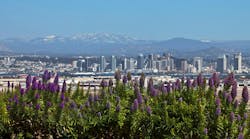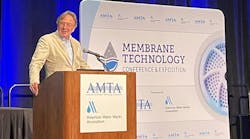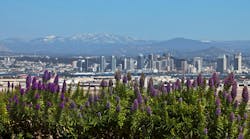• Unity Envirotech LLC becomes first manufacturer to earn NSF Certification to Protocol P353
ANN ARBOR, MI, Dec. 14, 2010 -- NSF International, a not-for-profit testing and certification organization committed to protecting the environment and public health, has developed a new protocol for organically-enhanced granular fertilizer production processes. The protocol evaluates granular fertilizers such as Unity-NS-Plus produced by Unity Envirotech LLC to verify that they are free of pathogens, noncombustible and meet the U.S. Environmental Protection Agency's (EPA) metal concentration requirements.
The new protocol, NSF Protocol P353: Sewage Sludge Sterilization in Organically-Enhanced Granular Fertilizer Production, creates a means for fertilizer manufacturers who use biosolids or sewage sludge to demonstrate their products comply with all requirements. Sewage sludge refers to the solids separated during the treatment of municipal wastewater.* Specific requirements of NSF P353 include:
The manufacturing facility must prepare and implement a quality assurance plan consistent with Hazard Analysis and Critical Control Point (HACCP) guidelines and undergo periodic audits and sampling to verify that the fertilizer it produces has no detectable amounts of bacteria, viruses, spores and parasites including Helminth ova.
The organically-enhanced granular fertilizer, dust or fine particles must be noncombustible.
The fertilizer must meet metals concentrations established by the EPA regulation Part 503 rule for "Class A Exceptional Quality" products or better for metals (i.e., arsenic, cadmium, mercury, etc.) in biosolids.**
If the fertilizer complies with the EPA Part 503 rule and the testing and evaluation (in accordance to P353) is completed successfully, as in the case with Unity Envirotech , NSF Certification is granted. The NSF Certified fertilizer appears on the NSF website
"NSF Protocol P353 is the first protocol to evaluate organically-enhanced granular fertilizer used in food crop applications," said Tom Bruursema, General Manager, NSF International's Wastewater and Environmental Research Programs. "It allows manufacturers to demonstrate the quality and sterilization of their fertilizer while complying with key food protection criteria."
NSF P353 was developed by an expert panel of public health professionals. The panel included academicians from the University of Manitoba and Tulane University; a public health regulator; representatives from the IFDC (formerly International Fertilizer Development Center); a chief of environmental affairs; a HACCP specialist; an NSF microbiologist; and a representative from Unity Envirotech.
"NSF Protocol P353 is the first protocol of its type for organically-enhanced granular fertilizer production processes. The protocol will provide municipal wastewater departments, farmers, trade associations, environmental organizations and the public with the ability to identify fertilizer products that are pathogen free, noncombustible and meet the EPA's heavy metal standards," said Unity Envirotech CEO Roger Tuttle. "Unity's granular organic/inorganic nitrogen sulfur fertilizers with micronutrients will help feed a growing population while utilizing the increasing quantity of sewage sludge."
If you have questions or are interested in pursuing certification to NSF P353, please contact Patrick Davison, NSF International Senior Project Manager, at [email protected] or view NSF's P353 Q&A
For more information on Unity Envirotech LLC, visit http://unity-envirotech.com or contact Roger Tuttle at [email protected].
About NSF International
NSF International, an independent, not-for-profit organization, certifies products and writes standards for food, water and consumer goods to minimize adverse health effects and protect the environment (www.nsf.org ). Founded in 1944, NSF is committed to protecting public health and safety worldwide and operates in more than 120 countries. NSF is a World Health Organization Collaborating Centre for Food and Water Safety and Indoor Environment.
The NSF Engineering and Research Services
NSF's Wastewater Treatment Program
Additional NSF services include Education and Training, safety audits for the food and water industries, dietary and nutritional supplement certification, and management systems registrations (e.g. ISO 14001) delivered through NSF International Strategic Registrations, Ltd.
* Source: US EPA Sewage Sludge/Biosolids Program: http://www.epa.gov/region9/water/npdes/sludge.html** Source: A Plain English Guide to the EPA Part 503 Biosolids Rule: http://water.epa.gov/scitech/wastetech/biosolids/503pe_index.cfm
###


